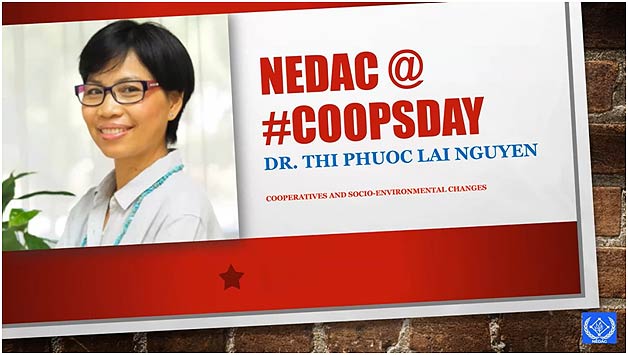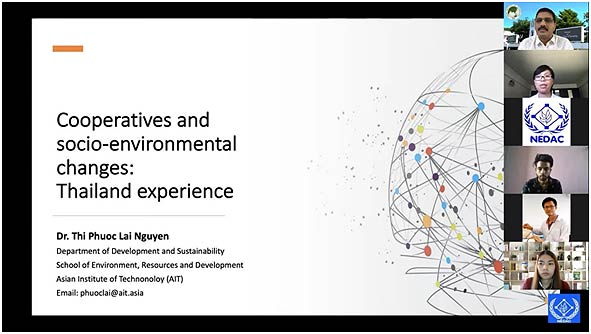RESPONSE TO PANDEMICS BY COOPERATIVES
Short technical session in the theme of “Cooperatives and Socio-environmental Changes: Experiences from Thailand”
Dr. Thi Phuoc Lai Nguyen, AIT, Thailand addressed the socio-environmental changes and local adaptations due to COVID-19 challenges on the occasion of International Cooperative Day 2021.

NEDAC commemorated the International Cooperative Day 2021by organizing a technical session in the theme of “Cooperatives and Socio-environmental Changes: Experiences from Thailand”. The invited speaker was Dr. Thi Phuoc Lai Nguyen,Assistant Professor, the Department of Development and Sustainability, Asian Institute of Technology (AIT), Thailand.
Dr. Lai started the presentation showing the impacts on production systems due to the socio-environmental changes, including the pandemic related disruptions. Five categories of adaptation were presented: mobility, storage of past surpluses, diversification, communal pooling, and market exchange which institutional and social factors are the key role in shaping the extent to which rural households and communities are vulnerable to different environmental risks.

Research case studies of promoting the roles of cooperatives in managing socio-environmental changes were demonstrated. Case study I examined the roles of cooperatives in promoting knowledge and practices towards sustainable agriculture. Case study II studied 270 farmers in Surin Province on the roles of cooperatives in promoting farmers’ individual and collective behaviors towards environmental adaptation. Case study III studied on the digital communication of community organizations included cooperatives on WASH (water, sanitation, and hygiene) and health protection measures of urban marginalized people against COVID-19 through 17 organizations and 453 respondents in Khlong Toei slum community, Thailand. The results revealed that the cooperatives have limited knowledge of ICT tools/devices to promote their products and poor access to the information especially market and/or producers. Therefore, the conclusion of the research case studies is that the promotion of cooperatives’ performance for local adaptation to socio-environmental changes need social capital development through cooperatives, institutional partnerships in facilitating local adaptation, enhancement of the capacity of cooperatives, institutional coordination across scales (for better planning and implementation), and promotion of social learning and behavioral change in/among cooperatives.
Dr. K.R. Salin, Honorary Director of NEDAC and Chair of AIT’s Aquaculture Program, who moderated the session, added that the cooperatives represent one of the best development models for empowering the rural communities to cope up with the challenges like climate change and the pandemics. Providing sufficient information and key tools that help the farmers face with the challenges is essential, as revealed by the research study presented by Dr. Lai.
More on this topic: https://www.youtube.com/watch?v=vVjBEAP6rIY&t=1934s
